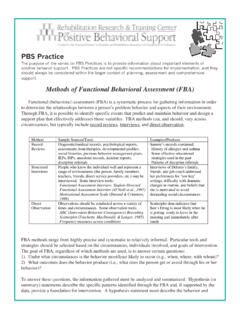Transcription of Case study: a practical analysis of a mental capacity ...
1 case study : a practical analysis of a mental capacity assessment Author: Daniel Baker Type: Guide Publication Date: 15 September 2015 Accessed: Photo: Sergei Mostovyi/Fotolia Introduction This practice analysis reflects on a particular piece of work analysing issues of mental capacity , choice, best interests and deprivation of liberty. It is written by Daniel Baker, lead officer mental capacity Act and Dols, safeguarding vulnerable adults team, at Central Bedfordshire Council. For the purpose of demonstrating depth and breadth of knowledge, at points during this case study he has hypothetically explored what actions may have been required if the circumstances were different.
2 The analysis of how the case was handled is provided by Steven Richards, director of Edge Training & Consultancy, who provides training on the mental capacity Act and deprivation of liberty safeguards. The legal analysis at the end of the case study is provided by Jess Flanagan, associate solicitor at Clarke Willmott, who specialises in welfare proceedings in the Court of Protection. The case Mrs Smith (not her real name) was 87-years-old. She had a diagnosis of dementia and presented with periods of short-term memory loss. Mrs Smith lived alone with a care package consisting of four double-up care calls per day.
3 A hoist was required for all transfers. In addition to the care workers, Mrs Smith s ex-husband visited daily to assist. Despite the care package there were reports of frequent falls requiring paramedics to attend because Mrs Smith asked her ex-husband to assist with transfers between the allotted care calls. Mrs Smith disclosed to her social worker that her ex-husband gets frustrated and has hit her. A bruise was noted on her face at the time of this disclosure. Mrs Smith agreed for a period of respite care which was arranged by her social worker while further assessments and enquiries took place regarding the safeguarding disclosures.
4 My involvement started after Mrs Smith had moved into respite care. I was asked to support the allocated social worker with Mrs Smith s mental capacity assessment in relation to accommodation. This piece of work formed part of a much wider intervention by the allocated social worker, including enquiries and risk assessments completed in line with Central Bedfordshire Council s multi-agency adult safeguarding policy. analysis The fact that Mrs Smith was already in respite care raises the question of whether her capacity to consent to this specific decision was assessed before the admission.
5 In this case , Mrs Smith was assessed as having capacity to agree to going into respite. The Supreme Court ruling in the Cheshire West case means that if a person is moved to a 24-hour staffed residential care placement and they lack capacity to consent to admission, then the potential for deprivation of liberty becomes a real possibility. The court judgment in AJ v A local authority [2015] EWCOP 5 noted that in the vast majority of cases it should be possible for a standard authorisation under the Deprivation of Liberty Safeguards to be put in place before a person has moved into a placement, where it is likely that the placement will lead to a deprivation of liberty.
6 In fact, this is expected by the Dols code of practice, chapter 3. Given the practical lowering of the threshold for deprivation of liberty, as a result of the Cheshire West decision in that a person is deprived of their liberty if under continuous supervision and control, not free to leave and their confinement is the responsibility of the state many people who lack capacity to agree to residential care are potentially likely to meet the threshold. The mental capacity Act 2005 provided the legal framework for my intervention. The act must be followed and, by section 42 of the act, I was required to have regard to the guidance in the accompanying code of practice (Department for Constitutional Affairs, 2007).
7 The code provides guidance on how best to support people to make decisions and how to assess functional ability, and also includes a checklist that decision makers should follow in determining best interests. The act describes what is meant by lack of mental capacity in section 2(1) and provides five principles that must underpin practice (section 1(2)-(6)). Brown et al (2013) provide a helpful practitioner s guide to these principles in their book The mental capacity Act 2005: A Guide for Practice. analysis The relationship between safeguarding adults and the mental capacity Act is a very close one.
8 Many people involved in safeguarding cases have problems with capacity to make decisions and this places them at risk of abuse. What the courts have consistently found, however, is that social care staff mistakenly believe they have express powers under the law to take coercive action to protect vulnerable adults. (Examples of two such cases are examined in this analysis on Community Care Inform Adults). This is not the case even with the advent of the Care Act 2014, which introduces a duty to investigate safeguarding concerns but no direct powers to take action (although in Wales section 127 of the new Social Services and Well-being Act 2014, when in force, will provide for Welsh local authorities to apply to a justice of the peace for an adult protection and support order.)
9 The writer of the article correctly identifies that it is the mental capacity Act that can be deployed in order to achieve protection, and the key issue under that act is whether the person involved has capacity to decide where to live. The mental capacity Act code of practice lists examples of when a professional might be required to assess a person s mental capacity . One of these is when somebody has been accused of abusing a vulnerable adult who may lack capacity to make decisions that protect them [DCA, 2007, chapter 4, p60]. This was my remit for questioning the presumption of capacity .
10 analysis It is important to note that the first principle of the act, which, along with the other four principles, applies to actions taken or decisions made under the act (DCA, 2007, p20, ), is that a person should be presumed to have capacity to make decisions unless proven otherwise. Therefore, although Mrs Smith has dementia, her capacity to make a decision should not be questioned unless there is a reason to do so. A social worker or other practitioner should ask themselves: Why am I assessing capacity ? . The code of practice (as statutory guidance to the legislation) highlights practical examples for staff on putting the first principle into practice.








